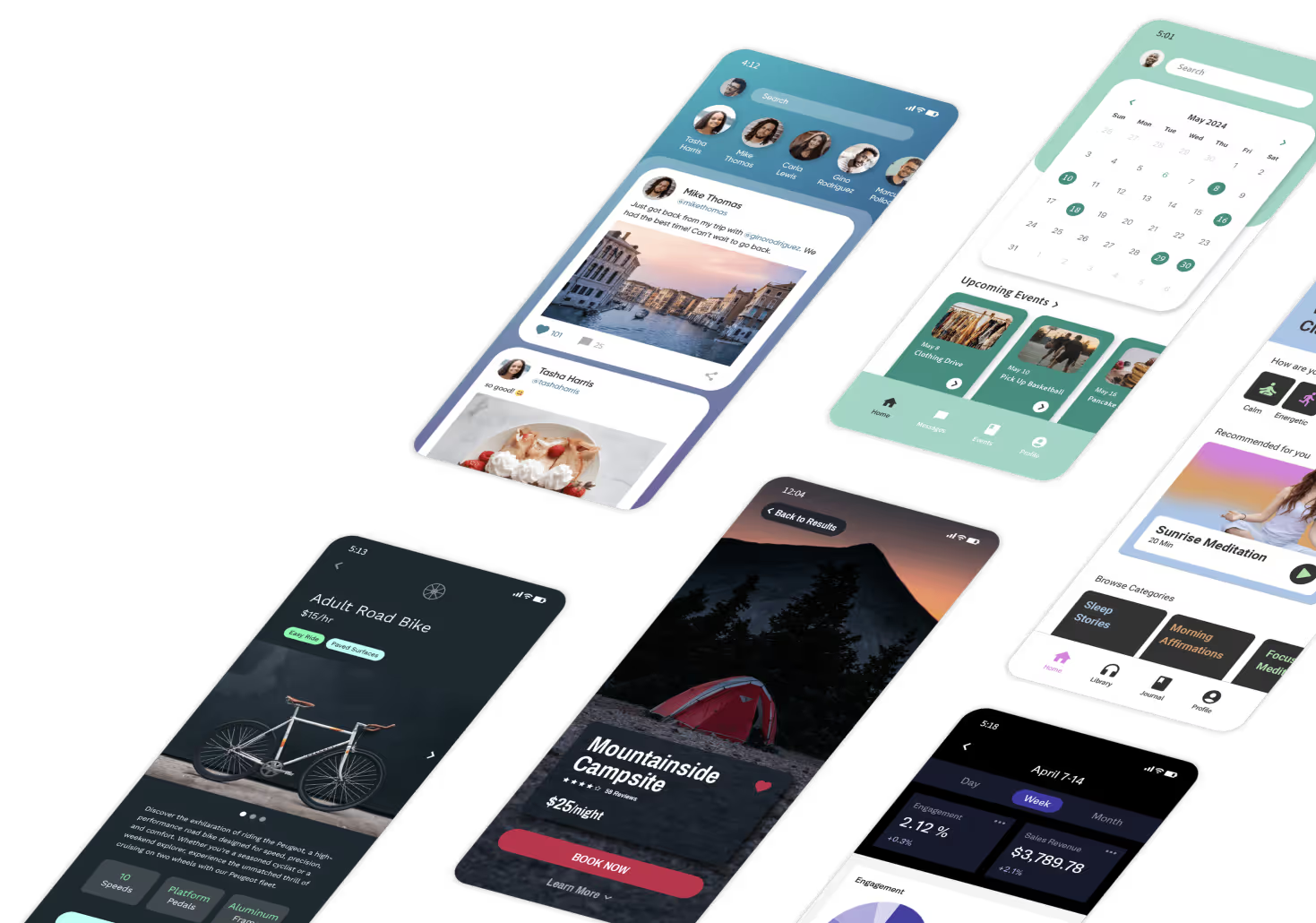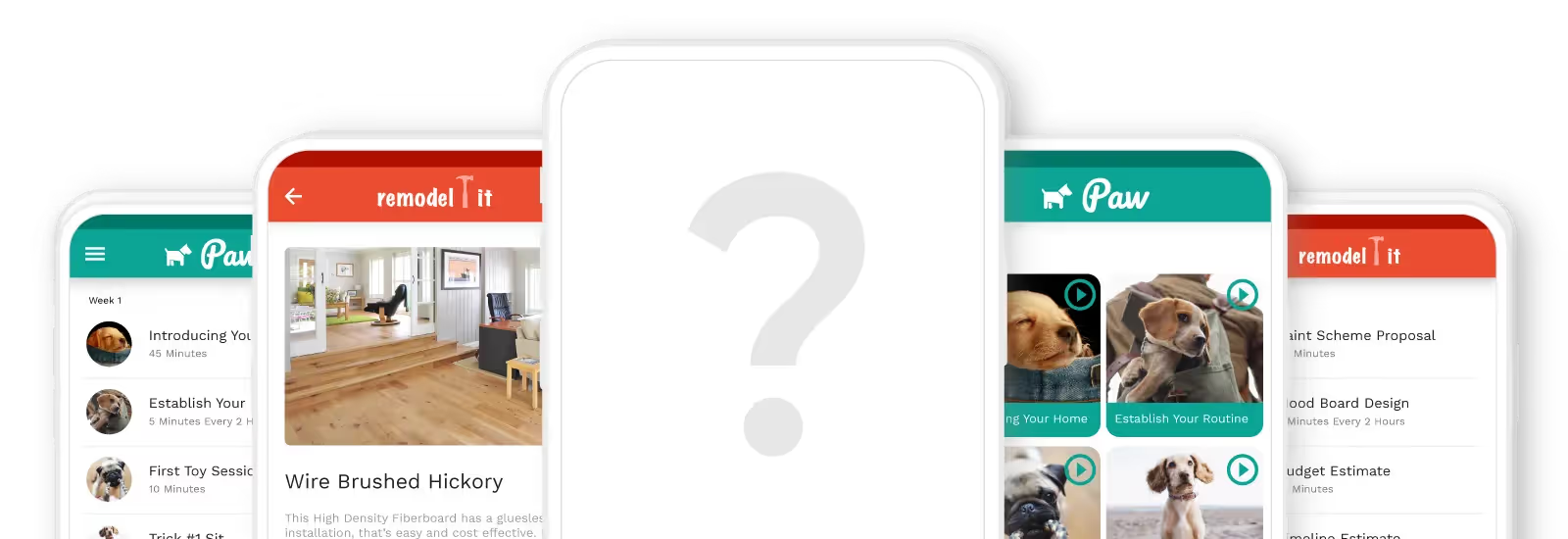
WeWeb’s pricing plans range between $29 and $179 per month for most tiers. If you’re curious about what pricing tier has to offer, read on, as we’ll cover the following:
- An introduction to WeWeb
- Summaries of WeWeb’s pricing tiers and the features they offer
- Determining if WeWeb is right for you
- Adalo, an excellent WeWeb alternative
Let’s now take a look at the WeWeb platform.
What is WeWeb?

WeWeb is a low-code frontend builder, so you’ll need to bring a premade database to use the platform. Because WeWeb is low-code, you’ll need some technical knowledge, like how APIs work with databases and the logic behind coding.
The platform accommodates creating internal business apps, such as data-displaying dashboards to highlight KPIs, CRM (customer-relationship management) tools for optimal client communication, project management boards for streamlined organization, and more.
While you won’t be able to create client-facing apps like one for booking appointments or social media, you’ll get robust features geared toward building a top-of-the-line internal business tool. For instance, WeWeb integrates with several popular database providers like MySQL and PostgreSQL and offers powerful security features.
WeWeb Pricing at a Glance
WeWeb has 2 sets of pricing tiers: One for smaller organizations (freelancers, entrepreneurs, and small businesses) and one for teams and agencies. For clarity, we’ve constructed the following tables.
Project Plans for Teams with 1 Person Using WeWeb
Workspace Plans for Teams and Agencies
WeWeb Project Plans Pricing
As we mentioned, WeWeb’s project plans are for smaller businesses that need to create a single app for their organization.
Free Version
The free version is designed to give you a feel for the building interface without any upfront cost. It allows you to develop and preview an app, but it doesn’t allow you to publish it on the web.
You’ll get access to many features found on the building interface. For instance, you’ll get data visualization tools like graphs, tables, and Kanban boards. Additionally, you can integrate APIs with several databases like MySQL, Xano, Supabase, and others. This makes connecting your premade backend to WeWeb’s frontend builder easy.
Starter ($49/month)
In addition to all the features you get from the free version, WeWeb’s Starter Plan lets you publish an app of up to 1 GB to the web using a custom domain (www.YOURDOMAIN.com). And your app can receive up to 50,000 monthly visits.
If you purchase the starter plan at an annual price of $468/year, you can keep your app’s source code. This allows you to share your code on GitHub with other developers and further develop your app using programming.
Additionally, if you buy this plan at the annual price, WeWeb allows you to host your app on-prem (in-house on your server). This feature provides granular control over your app’s infrastructure, bolsters security, and almost guarantees your IT team a universal PMA (positive mental attitude).
Scale ($179/month)
True to its name, the Scale Plan lets you publish an app of up to 10GB and get up to 250,000 monthly visitors. It provides the same access to your app’s source code if you go with annual pricing.
The Scale Plan offers app backups, so you won’t need to worry about earlier edits you made being lost. This plan also provides app staging options, allowing you to identify glitches, bugs, and other issues before publishing.
Enterprise (Contact Sales)
WeWeb’s Enterprise plan is for the big kids. You’ll be able to build an app as large as you need and with as many monthly visitors as possible. It also gives you advanced security features like single sign-on, so you can rest easy knowing your app is in good hands.
You’ll need to contact the WeWeb Sales team directly via the website, as pricing will be catered to your enterprise needs.
WeWeb Workspace Plans Pricing
Need more than 1 editor on your app? Try out WeWeb’s Workspace plans.
Standard (Free)
Like the Project Plan Free version, the Standard version lets you experience the building interface without publishing your app. You can integrate your data sources and learn the system with only 1 editing seat.
Team ($29/month per user)
The Team Version allows for up to 3 app-editors, who can work on your app simultaneously. This feature keeps your team on the same page when building apps, which can help you create your app quickly.
You’ll also be able to grant your users different permissions and roles so certain people can only access what you want them to see. This allows you to create a large app where clients can log in to an account but can’t view sensitive internal information, like revenue and cost data.
This version also allows for various API integrations so that you can gather data from third-party tools like Google Maps, Stripe, and more.
Business ($59/month per user)
In addition to all the features and integrations offered by the Team Version, opting for the Business Version provides you with up to 9 app editors.
You’ll also be able to patch in components you’ve made with your programming skills.
Partner ($79/month per user)
The Partner Version catered to agencies, allowing for more app-editors than the Business Version and unlimited apps. It also lets you become an affiliate partner with WeWeb, giving you a 20% commission for every client you bring in.
You’ll also be featured on WeWeb’s agency list, which can give you extra exposure and provide an additional source of leads.
Enterprise (Contact Sales)
The Enterprise Plan is for agencies with many clients who want to scale. In addition to all the features of the Partner Plan, you’ll also get a custom number of editor seats, the option for self-hosting, and premium support from WeWeb.
Is WeWeb Worth It?
While WeWeb packs a serious punch for some, others might want to seek an alternative. Here are some points to consider when evaluating WeWeb:
- WeWeb only creates a frontend: You’ll need to bring a third-party database when you build an app with WeWeb. While this works for several businesses, those who don’t already have a database will need to learn how to use a database builder in addition to learning WeWeb.
- It might be a solid option for agencies: The Partner Plan allows unlimited apps and 20+ editors. Hypothetically, you’d pay at least $790/month (billed monthly) if you have a team of 10 developers to create as many apps as you wish — you’ll also be able to plug in components made from coding.
This option might be lucrative if you’re a growing agency.
- Only for internal business tools: Unfortunately, if you want an app for booking appointments, ordering, or other client-facing tasks, you’ll probably need to look elsewhere, as WeWeb doesn’t directly support building these apps.
- No app store publishing: While WeWeb does allow for Progressive Web App publishing, which lets users download your app to their phones from a link, you won’t be able to release your app to the Apple App Store or Google Play Store.
The app stores are excellent app marketplaces, with over 1 billion monthly visitors keen to download an app.
'{{rich-cta}}'
Adalo: A Flexible WeWeb Alternative
Want to create more than just an internal business app? Get Adalo.
Adalo is a no-code native mobile app-building platform that, unlike WeWeb, requires no coding, programming, or technical expertise. This means Adalo is easier and more intuitive than WeWeb.
However, Adalo is also wicked powerful. You can connect databases from Airtable, Xano, Google Sheets, and more. Additionally, you can transfer data to your app from 1,000s of third-party applications like Zapier, QuickBooks, Stripe, and more.
Finish building your app and publish it on the web, the Apple App Store, and the Google Play Store to get it in front of an enormous audience. Try Adalo’s free version today.














